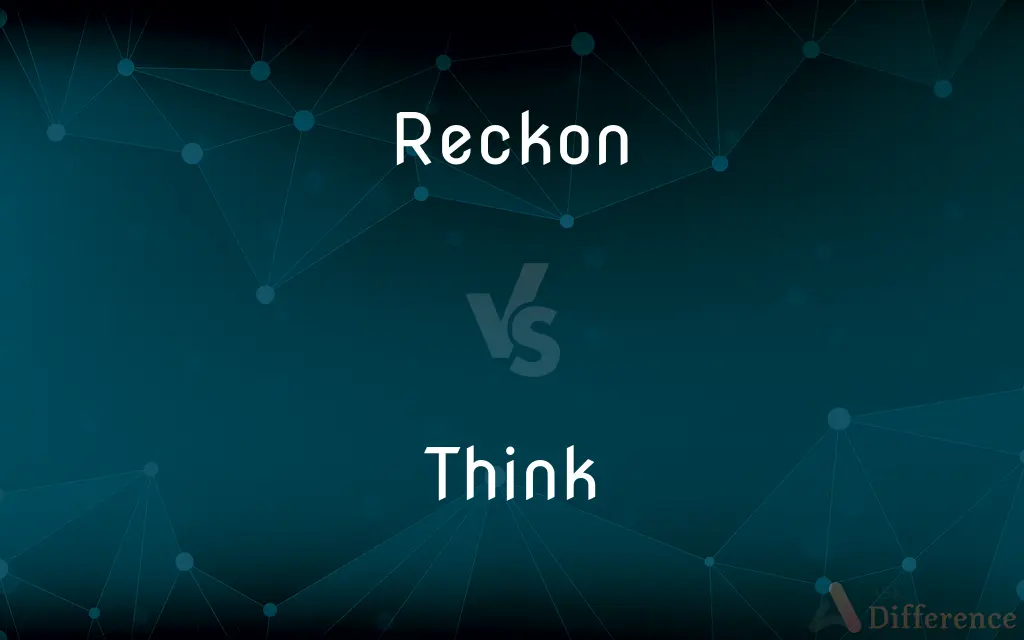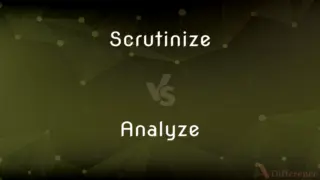Reckon vs. Think — What's the Difference?
By Fiza Rafique & Maham Liaqat — Updated on May 4, 2024
Reckon involves estimating or concluding after consideration, often based on informal or intuitive judgement, while think is a broader cognitive process involving reasoning, reflecting, or forming opinions about something.

Difference Between Reckon and Think
Table of Contents
ADVERTISEMENT
Key Differences
Reckon is primarily used to suggest an estimation or a calculation, often based on personal judgment or external factors, whereas think involves a broader intellectual process that includes reasoning, analyzing, and sometimes speculating.
Reckon often implies a quicker, sometimes less formal approach to forming a judgment or opinion, whereas think can encompass a wide range of mental activities, from quick thoughts to deep contemplation.
In usage, reckon is more common in informal English and certain dialects, such as Australian or Southern American English, while think is universally used across all forms of English and contexts.
While reckon sometimes carries a connotation of approximate accuracy, think is neutral and relates purely to mental processes without any implied accuracy or inaccuracy.
Reckon can also be used in the sense of expecting or supposing something (e.g., "I reckon it'll rain today"), whereas think is used to formulate or hold an opinion or belief (e.g., "I think it will rain today").
ADVERTISEMENT
Comparison Chart
Definition
Estimate or conclude something, often informally
Engage in thought, either casually or deeply
Connotation
Often informal, implies approximation
Neutral, involves a range of mental processes
Common Usage
More frequent in informal settings or specific dialects
Widely used in all contexts and forms of English
Type of Process
Quick, judgment-based
Broad, ranging from quick thoughts to detailed analysis
Example Contexts
"I reckon she's about 45 years old."
"I think deeply about philosophical questions."
Compare with Definitions
Reckon
To expect or anticipate.
They reckon to finish the work by Tuesday.
Think
To reflect or ponder.
Think on these things before you act.
Reckon
To settle accounts.
It’s time to reckon up our expenses.
Think
To believe or suppose.
He thinks they've already left.
Reckon
To calculate approximately.
He reckons the total cost will be around $200.
Think
To form or have an opinion.
I think he will agree with the decision.
Reckon
To believe or think.
I reckon you are right about the changes.
Think
To devise or plan.
We need to think a strategy for marketing.
Reckon
To consider or regard in a specific way.
She reckons him a fool for his choices.
Think
To use the mind to consider ideas.
She thinks carefully before speaking.
Reckon
To count or compute
Reckon the cost.
Think
To have or formulate in the mind
Think the happiest thought you can think.
Reckon
To consider as being; regard as
A book that was reckoned a masterpiece.
Think
To reason about or reflect on; ponder
Think how complex language is. Think the matter through.
Reckon
To think or conclude
I reckon what you say is true.
Think
To decide by reasoning, reflection, or pondering
Thinking what to do.
Reckon
To expect or intend (to do something)
"You reckon to call the sheriff?" (Cormac McCarthy).
Think
To judge or regard; look upon
I think it only fair.
Reckon
To make a calculation; figure.
Think
To believe; suppose
Always thought he was right.
Reckon
Chiefly South & South Midland To think or believe
I reckon so.
Think
To expect; hope
They thought she'd arrive early.
Reckon
To count; to enumerate; to number; also, to compute; to calculate.
Think
To intend
She thinks to defeat the incumbent in the election.
Reckon
To count as in a number, rank, or series; to estimate by rank or quality; to place by estimation; to account; to esteem; to repute.
Think
To call to mind; remember
I can't think what her name was.
Reckon
To charge, attribute, or adjudge to one, as having a certain quality or value.
Think
To visualize; imagine
Think what a scene it will be at the reunion.
Reckon
(colloquial) To conclude, as by an enumeration and balancing of chances; hence, to think; to suppose; -- followed by an objective clause
I reckon he won't try that again.
Think
To devise or evolve; invent
Thought up a plan to get rich quick.
Reckon
To reckon with something or somebody or not, i.e to reckon without something or somebody: to take into account, deal with, consider or not, i.e. to misjudge, ignore, not take into account, not deal with, not consider or fail to consider; e.g. reckon without one's host
Think
To bring into a given condition by mental preoccupation
He thought himself into a panic over the impending examination.
Reckon
(intransitive) To make an enumeration or computation; to engage in numbering or computing.
Think
To concentrate one's thoughts on; keep as a point of focus
Think victory.
Reckon
To come to an accounting; to draw up or settle accounts; to examine and strike the balance of debt and credit; to adjust relations of desert or penalty.
Think
To exercise the power of reason, as by conceiving ideas, drawing inferences, and using judgment
My cold made it difficult to think.
Reckon
To count; to enumerate; to number; also, to compute; to calculate.
The priest shall reckon to him the money according to the years that remain.
I reckoned above two hundred and fifty on the outside of the church.
Think
To consider or weigh an idea
They are thinking about moving.
Reckon
To count as in a number, rank, or series; to estimate by rank or quality; to place by estimation; to account; to esteem; to repute.
He was reckoned among the transgressors.
For him I reckon not in high estate.
Think
To bring a thought to mind by using the imagination
No one before had thought of bifocal glasses.
Reckon
To charge, attribute, or adjudge to one, as having a certain quality or value.
Faith was reckoned to Abraham for righteousness.
Without her eccentricities being reckoned to her for a crime.
Think
To recall a thought or an image to mind
She thought of her childhood when she saw the movie.
Reckon
To conclude, as by an enumeration and balancing of chances; hence, to think; to suppose; - followed by an objective clause; as, I reckon he won't try that again.
Think
To have a belief, supposition, or opinion
He thinks of himself as a wit. It's later than you think.
Reckon
To make an enumeration or computation; to engage in numbering or computing.
Think
To have care or consideration
Think first of the ones you love.
Reckon
To come to an accounting; to make up accounts; to settle; to examine and strike the balance of debt and credit; to adjust relations of desert or penalty.
"Parfay," sayst thou, "sometime he reckon shall."
After a long time the lord of those servants cometh, and reckoneth with them.
Think
To use the mind in a certain way
He thinks just like you do—always worrying.
Reckon
Expect, believe, or suppose;
I imagine she earned a lot of money with her new novel
I thought to find her in a bad state
He didn't think to find her in the kitchen
I guess she is angry at me for standing her up
Think
Requiring much thought to create or assimilate
A think book.
Reckon
Judge to be probable
Think
The act or an instance of deliberate or extended thinking; a meditation.
Reckon
Deem to be;
She views this quite differently from me
I consider her to be shallow
I don't see the situation quite as negatively as you do
Think
(transitive) To ponder, to go over in one's head.
Idly, the detective thought what his next move should be.
Reckon
Make a mathematical calculation or computation
Think
(intransitive) To communicate to oneself in one's mind, to try to find a solution to a problem.
I thought for three hours about the problem and still couldn’t find the solution.
Reckon
Have faith or confidence in;
You can count on me to help you any time
Look to your friends for support
You can bet on that!
Depend on your family in times of crisis
Think
(intransitive) To conceive of something or someone (usually followed by of; infrequently, by on).
I tend to think of her as rather ugly.
Reckon
Take account of;
You have to reckon with our opponents
Count on the monsoon
Think
(transitive) To be of opinion (that); to consider, judge, regard, or look upon (something) as.
At the time I thought his adamant refusal to give in right.
I hope you won’t think me stupid if I ask you what that means.
I think she is pretty, contrary to most people.
Boxing is thought to be a dangerous sport.
Think
(transitive) To guess; to reckon.
I think she’ll pass the examination.
Think
To plan; to be considering; to be of a mind (to do something).
Think
To presume; to venture.
Think
To seem, to appear.
Think
An act of thinking; consideration (of something).
I'll have a think about that and let you know.
Think
To seem or appear; - used chiefly in the expressions methinketh or methinks, and methought.
Think
To employ any of the intellectual powers except that of simple perception through the senses; to exercise the higher intellectual faculties.
For that I amI know, because I think.
Think
To call anything to mind; to remember; as, I would have sent the books, but I did not think of it.
Well thought upon; I have it here.
Think
To reflect upon any subject; to muse; to meditate; to ponder; to consider; to deliberate.
And when he thought thereon, he wept.
He thought within himself, saying, What shall I do, because I have no room where to bestow my fruits?
Think
To form an opinion by reasoning; to judge; to conclude; to believe; as, I think it will rain to-morrow.
Let them marry to whom they think best.
Think
To purpose; to intend; to design; to mean.
I thought to promote thee unto great honor.
Thou thought'st to help me.
Think
To presume; to venture.
Think not to say within yourselves, We have Abraham to our father.
Think
To conceive; to imagine.
Charity . . . thinketh no evil.
Think
To plan or design; to plot; to compass.
So little womanhoodAnd natural goodness, as to think the deathOf her own son.
Think
To believe; to consider; to esteem.
Nor think superfluous other's aid.
Think
Act of thinking; a thought.
Think
An instance of deliberate thinking;
I need to give it a good think
Think
Judge or regard; look upon; judge;
I think he is very smart
I believe her to be very smart
I think that he is her boyfriend
The racist conceives such people to be inferior
Think
Expect, believe, or suppose;
I imagine she earned a lot of money with her new novel
I thought to find her in a bad state
He didn't think to find her in the kitchen
I guess she is angry at me for standing her up
Think
Use or exercise the mind or one's power of reason in order to make inferences, decisions, or arrive at a solution or judgments;
I've been thinking all day and getting nowhere
Think
Recall knowledge from memory; have a recollection;
I can't remember saying any such thing
I can't think what her last name was
Can you remember her phone number?
Do you remember that he once loved you?
Call up memories
Think
Imagine or visualize;
Just think--you could be rich one day!
Think what a scene it must have been!
Think
Focus one's attention on a certain state;
Think big
Think thin
Think
Have in mind as a purpose;
I mean no harm
I only meant to help you
She didn't think to harm me
We thought to return early that night
Think
Decide by pondering, reasoning, or reflecting;
Can you think what to do next?
Think
Ponder; reflect on, or reason about;
Think the matter through
Think how hard life in Russia must be these days
Think
Dispose the mind in a certain way;
Do you really think so?
Think
Have or formulate in the mind;
Think good thoughts
Think
Be capable of conscious thought;
Man is the only creature that thinks
Think
Bring into a given condition by mental preoccupation;
She thought herself into a state of panic over the final exam
Common Curiosities
Which term is more informal?
Reckon is generally considered more informal compared to think.
What does reckon typically imply in usage?
Reckon typically implies a form of estimation or judgment, often informal.
What mental activity does think encompass?
Think encompasses analyzing, reasoning, reflecting, and forming opinions.
Can reckon be used interchangeably with think?
Not always, as reckon often involves a subjective estimation, while think is more general and neutral.
Is "think" used more broadly than "reckon"?
Yes, think is used more broadly to cover all forms of mental engagement, from simple to complex thoughts.
Is there a regional preference for using reckon?
Yes, reckon is more commonly used in Southern American English and Australian English.
How does the speed of mental processing compare between reckon and think?
Reckon typically suggests quicker, more intuitive processing, whereas think can be both quick and slow, depending on the context.
Are there specific contexts where reckon is preferred?
Reckon is often preferred in casual conversations or when making informal estimates.
Does reckon have synonyms that carry the same informal tone?
Yes, terms like guess or suppose carry similar informal tones.
What role does culture play in the use of reckon?
Cultural and regional dialects influence the preference for using reckon, especially in the South of the USA and Australia.
What is a key difference in connotation between reckon and think?
Reckon implies approximation, while think does not carry such a connotation.
Can both terms be used in professional contexts?
Think is more appropriate in professional contexts due to its neutrality; reckon might appear too informal.
Share Your Discovery

Previous Comparison
Loyalty vs. Integrity
Next Comparison
Scrutinize vs. AnalyzeAuthor Spotlight
Written by
Fiza RafiqueFiza Rafique is a skilled content writer at AskDifference.com, where she meticulously refines and enhances written pieces. Drawing from her vast editorial expertise, Fiza ensures clarity, accuracy, and precision in every article. Passionate about language, she continually seeks to elevate the quality of content for readers worldwide.
Co-written by
Maham Liaqat















































